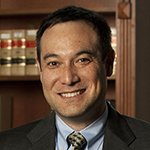John Inazu, JD, PhD, discusses confident pluralism, the idea that our shared existence is not only possible, it’s necessary.
Even a cursory glance at today’s headlines reveals a deep inability to get along. From politics, to religion, to social issues, extreme positions may play well with a political base, but do little to further substantive conversation and real change.
How do we get back to forming meaningful relationships that can move toward common ground despite our deep ideological differences?

The answer lies in a confident pluralism, said an expert on law and religion at Washington University in St. Louis.
“Confident pluralism insists that our shared existence is not only possible, but necessary,” said John Inazu, JD, PhD, associate professor of law at the School of Law.
“Instead of the elusive goal of E pluribus unum (Out of many, one), confident pluralism suggests a more modest possibility — that we can live together in our ‘many-ness.’ It does not require Pollyanna-ish illusions that we will resolve our differences and live happily ever after. Instead, it asks us to pursue a common existence in spite of our deeply held differences,” Inazu said.
Inazu’s forthcoming book on the subject, “Confident Pluralism: Surviving and Thriving Through Deep Difference,” is scheduled to be published by the University of Chicago Press in April 2016.
“Confident pluralism really argues we can and must live together peaceably in spite of deep and sometimes irresolvable differences over politics, religion, sexuality and other important matters,” Inazu said. “We can do so in two important ways — by insisting on constitutional commitments that honor and protect difference, and by embodying civic aspirations in our speech, our collective action and our relationships across difference.”
Confident pluralism requires three aspirations to secure its civic practices, Inazu said. Those are tolerance, humility and patience.
“These three aspirations are not self-evidently ‘confident,’ ” Inazu said. “We might think of them as concessions that would come from a lack of confidence. But it is, in fact, the confidence in our own views and beliefs in the midst of deep difference that allows us to engage charitably with others.”
For more on confident pluralism, see Inazu’s essay in the Hedgehog Review.